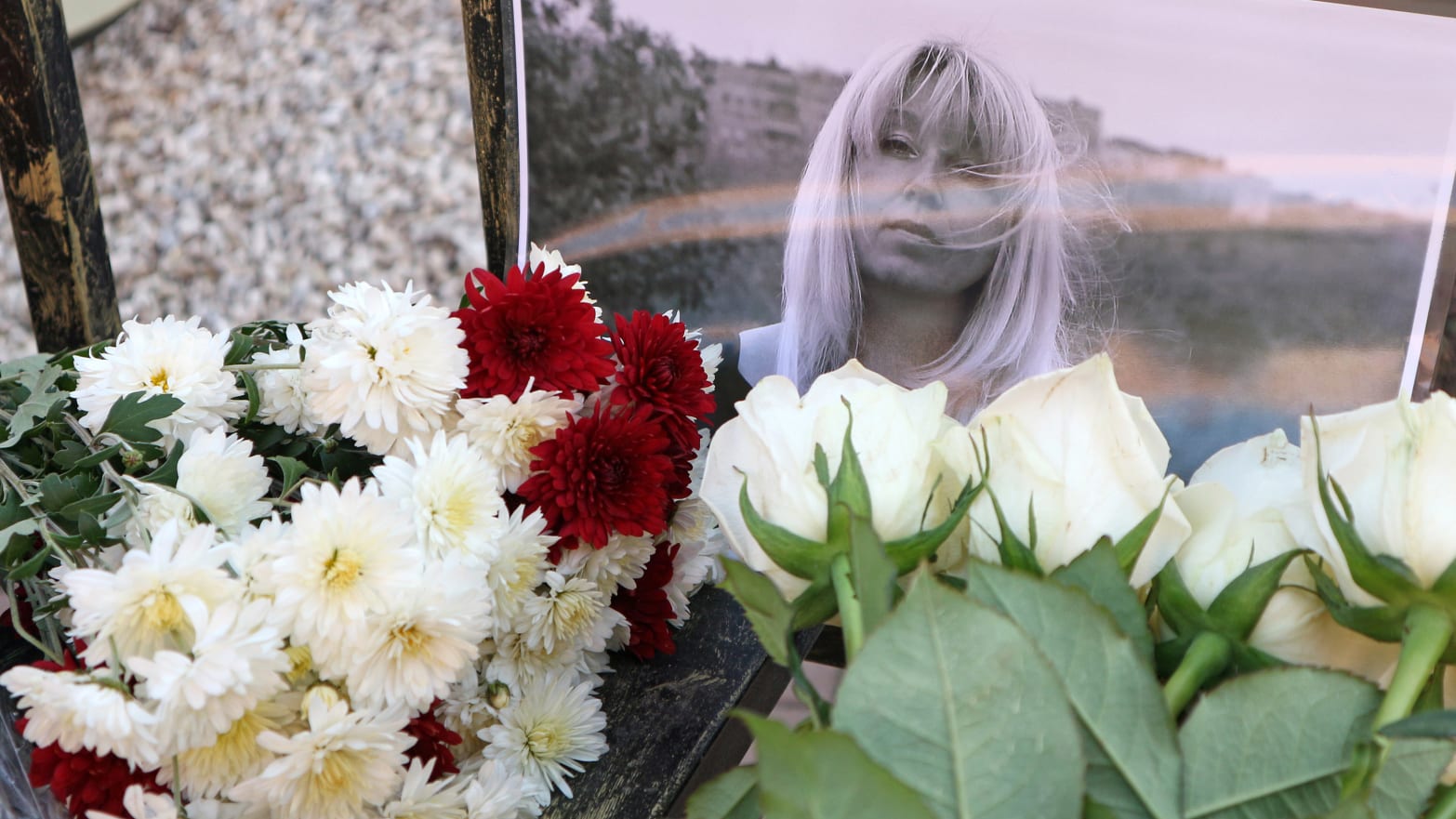NIZHNY NOVGOROD—A funeral was held Tuesday for Irina Slavina, a celebrated local journalist, who set herself on fire outside the police headquarters in Nizhny Novgorod and died.
But this is not a story about a reporter committing suicide.
Hundreds of thousands read Slavina’s website, Koza.Press, the bravest media outlet in the city. Her readers knew exactly what she meant in her final Facebook post: “Blame the Russian Federation for my death,” it said.
The authorities have been persecuting, investigating, and interrogating this sensible and dignified woman for years. On October 1, local law enforcement broke down the door to her apartment and confiscated her computer. “It was the last straw,” opposition politician Alexey Sadomovsky told Kholod.
Hundreds of citizens who cherish free, independent media came to say goodbye at the House of Scientists. They were here to listen, and to understand what has happened not only to this reporter but to freedom of speech in Russia.
Images of a happy, blonde woman were projected onto a screen in the hall. The auditorium filled up with sobbing men and women, their faces hidden beneath medical masks. People came up to the stage and placed flowers around a white coffin that contained Slavina’s burnt remains.
The funeral soon turned into a something more—a significant event in a country where political rallies, even one-man protests, have been banned during the COVID-19 pandemic. Kremlin critics, Slavina’s friends, civil society leaders, and ordinary readers of Koza.Press took turns at the microphone. They spoke out. Some demanded the city rename Gorky Street after 47-year-old “martyr” Slavina, others thanked their favorite journalist for her “bravery,” for “demonstrating dignity,” for “waking us up.”
A prominent human rights defender, Stanislav Dmitriyevsky, came up to the microphone: “Stop being afraid, stop being silent! We should not just sit and grieve, she challenged all of us,” he bellowed.
A voice from the hushed crowd, rang out: “That’s right!”
The crowd in the auditorium burst into applause as Dmitriyevsky continued: “We cannot accept Irina’s horrible act but if even her burning herself to ashes is not going to wake us up, we are just dust in our own emptiness. Let’s face the truth: The power has killed her, the symbol of that KGB power is hanging on that wall.”
A woman in an elegant suit approached the portrait of Vladimir Putin on the wall by the staircase. She tried to hang a teddy bear’s mask over it, but she was stopped by the building’s security. A young man followed suit, trying to cover Putin’s image with a stop sign on a piece of paper. Several people asked the security guard to allow them cover “the face of the power that killed Irina” but the guard stood firm.
Slavina’s daughter Margorita Nekrasova, watched the ceremony stoically. The day before she stood with a sign on the city’s central street: “While my mother was burning, you were silent.”
Then she posted on Slavina’s Facebook: “I will bring them to justice, mama.”
The funeral turned into a demonstration; people stopped being afraid to say what they really thought. Well-respected journalist Svetlana Kukina stood at the microphone: “When the time comes and all the bots who write disgusting things about Slavina get paid and shut up, I hope we turn Slavina into a symbol of all the right, just, light things that will help my city and my country become a better place.”
She was struggling to hold back tears, she was a close friend of Slavina. They had both been reporters in 1990s, solid democrats, who remembered the time when this city full of secret military factories was closed to foreigners. Boris Nemtsov, the city’s first democratic governor, opened it up in 1991 and changed its name from Gorky back to its historical name, Nizhny Novgorod.
Next year, this beautiful city on Russia’s main river, the Volga, will celebrate its 800th anniversary. “Social media’s been blowing up, thousands of Slavina’s supporters want the street, where she died, to be named after her,” young journalist, Iyulianna Guseva, told The Daily Beast.
To understand what Slavina’s generation of journalists were made of, one needs to think back to the tumultuous time of Perestroika, Viktoria Azarova, a local tourist guide and culture expert, told The Daily Beast. “I remember Slavina working day and night without weekends, even when she was taking care of her seriously ill husband, she used to say, ‘A real reporter burns in her soul,’” Azarova said.
The day before her self-immolation, Slavina posted a list of four names with a comment: “Here is a full of list of those serving the investigation and trying to shut everybody’s mouth on the case of Mikhail Iosilevich.”
The authorities were investigating Iosilevich for his alleged cooperation with exiled Putin critic, Mikhail Khodorkovsky. He is a businessman but also the leader of a parody cult, the Church of the Flying Spaghetti Monster.
Investigators raided Slavina’s apartment last Thursday. Slavina described what happened on social media: “I was still naked at 6 a.m., had to dress up, while a woman, a stranger was watching me.” Officials took away all Slavina’s equipment, including an expensive video camera, her husband’s and her daughter’s laptops. “Our journalists have very low incomes, can hardly afford buying a new camera. Irina’s Koza.Press existed on crowdfunding,” Azarova said.
Koza.Press could not afford to pay freelancers, so Slavina wrote most of the articles herself. Court decisions “strangled” her, Dmitriyevsky told The Daily Beast. Once last year the reporter had to pay an approximately $1,000 dollar fine for “disrespecting” authorities after she published a piece mocking a new memorial to Joseph Stalin in the region.
Next time she had to pay almost as much for reporting on the first COVID-19 patient in the small town of Kstovo. “I read that article, every word in it was true,” Konstantin Yefimov, a taxi driver in the town of Kstovo, told The Daily Beast. “She was the first journalist to talk about the epidemic in our town, so they immediately tried to squash her.”
A crowd of about 300 people marched from the House of Scientists to the police headquarters on Gorky Street on Tuesday afternoon. At the ceremony, journalist Valentina Buzmakova remembered the Soviet times: “I sometimes think it was easier even in Stalin’s times. Today the state machine is lying to us systematically, it is impossible to breathe, to scream, so Slavina chose to do what she did,” Buzmakova said.
Buzmakova, as well as dozens of Russian professionals and independent journalists, condemned the authorities for pushing Slavina to her last, terrifying protest.
If you or a loved one are struggling with suicidal thoughts, please reach out to the National Suicide Prevention Lifeline at 1-800-273-TALK (8255), or contact the Crisis Text Line by texting TALK to 741741.

